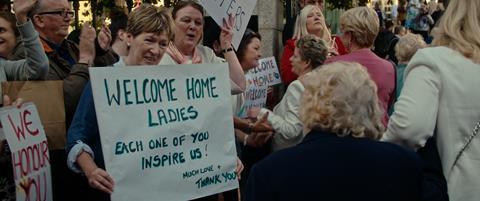Testimony reveals decades of institutional abuse at Ireland’s Magdalene Laundries. The shocking details of torture, slave labour and human trafficking don’t make for easy viewing, says Giles Gough, but Christians must not turn away from the brutality inflicted in God’s name

Directed by award-winning filmmaker, Aoife Kelleher and narrated by Imelda Staunton, Testimony follows the unwavering determination of the Justice for Magdalenes team, as they work tirelessly to hold the Irish government accountable for decades of institutional abuse.
This hard-hitting documentary focusses on the scandal of the Magdalene Laundries. These horrific institutions were run by religious orders staffed by nuns, and date back to the 18th century. Yet this is no look back at a far-past history. The last one closed in 1996.
Between 1922 and 1996, more than 10,000 women were detained in Magdalene Laundries against their will. At the Mother and Baby homes, unmarried mothers endured the trauma of being forced to give their children up for adoption. The separations were often executed in secrecy and without consent. Wealthy couples paid large sums of money to adopt children and take them far away from their birth mothers, making any future reunion impossible.
The Magdalene Laundries dehumanised the women and young girls through backbreaking labour and practises that effectively amounted to torture. Those who attempted to escape were often brought back by the police - meaning that the Irish state was complicit in their false imprisonment.
Digging up details
The documentary begins with a seemingly small detail; a former Magdalene Laundry has been sold to a property developer. The construction of a new a driveway passed through a cemetery built at the institution. But as workers began the exhumation, many more bodies were found than official figures stated. Out of the 155 bodies exhumed, only 75 had official death certificates.
From this starting point, the film builds like a meticulous legal case against the Magdalene Laundries and the religious orders that ran them.
Many people may feel that they already know the broad strokes of the story surrounding these institutions. Films such as 2013’s Philomena, and BBC drama The Woman in the Wall shined a much-needed light on how unwed pregnant women were imprisoned under the guise of ‘moral rehabilitation’, as well as the lifelong stigma of being branded a ‘fallen woman’.
But it’s the specific details in Testimony that hammer home the truly gross levels of injustice inflicted by the Church and State.
These heinous acts were carried out in the name of God. It is nothing short of despicable
The fact that children were kept at the homes until they were two or three years old seems odd, until you realise that the nuns were waiting until they were certain the children were healthy before selling them overseas for adoption.
Or the fact that vaccine trials were conducted on women and their babies without informed consent. Or the mother who is not told exactly where her newborn son is buried. The litany of abuses goes on and on.
Children in care - who had often already experienced abuse, neglect and trauma – were also funnelled into the Magdalene Laundries. ‘Training centres’ such as the one singer-songwriter Sinead O’Connor was forced to attend, often sat alongside them. One survivor, Elizabeth, says: “It was slopping out, locked in a cell at night, sheer hard work. I was in the actual wet part, not understanding why for years, daily sitting in a swamp of water with wellingtons and wearing a rubber apron. That was my life and it was my teenage years”.
There was no justification for the way these girls were treated; and much of the power of Testimony comes from naming these practises for what they were: slave labour, torture and human trafficking.
Atoning for sins
Testimony is a reminder that when Margaret Atwood wrote The Handmaid’s Tale, she only took plot devices from abuses that had already occurred in world history. The fact that these heinous acts were carried out in the name of God, by people purporting to serve him, is nothing short of despicable. But it’s worth noting that the film rarely talks about individuals, instead focussing on the institutional sin rather than the personal.
Much of the power comes from naming these practises: slave labour, torture and human trafficking
At the time of release, that sin is still not fully atoned for. The film names all of the religious orders complicit in this abuse, and the painfully small number who have agreed to pay reparations to their victims.
It would be hard to watch a film like Testimony without feeling unmoved. The tone is never over-wrought or manipulative but instead holds an unflinching and honest gaze. This serves as a tribute to the resilience of the survivors and a reminder of the ongoing need for justice and accountability.
It is not an easy watch, but an important one.
Testimony is screening at selected cinemas across the UK and Ireland from 21-28 November






































No comments yet